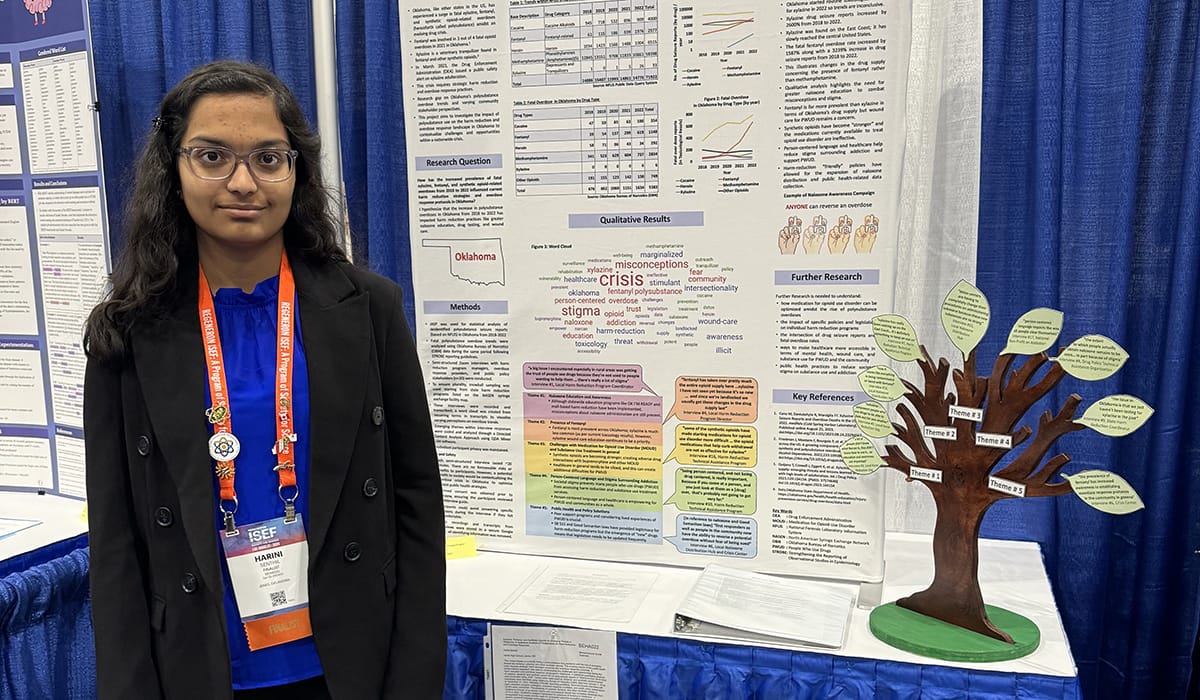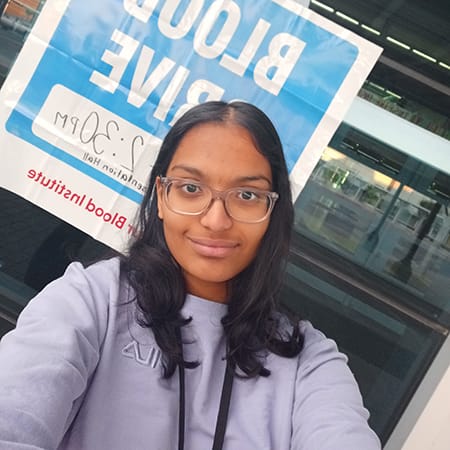Addressing Addiction: America’s Opioid Problem

Meet Daily Point of Light Award honoree Harini Senthil. Read her story, and nominate an outstanding volunteer or family as a Daily Point of Light.
Harini Senthil is only 18 years old but is already thoughtfully addressing matters of life, death and the moments in between that can change a person’s course. She is the chair of the Tulsa Opioid Informed Affected (TOIA) Youth Advisory Board where she uses her skills to advocate for more effective substance use prevention education. She even presented the group’s research and how it has changed over time to professionals in relevant fields. Her heavy involvement in speech and debate club has increased her ability to effectively advocate and share important messages with the larger community.
Separate from her work on the TOIA board, Harini has run “deaths of despair” research identifying the correlation between socioeconomic conditions and overdose rates in all 77 of Oklahoma’s counties and published an op-ed in Tulsa World, a local newspaper, about safe medication disposal practices. She even built an app that helps users track medication expiry dates and facilitate drug take back events that was named the 2024 Congressional App Challenge winner for Oklahoma’s 1st district.
She also coordinates free tutoring sessions with her high school’s Math Club and delivers flowers and helps patients navigate the hospital at Oklahoma State University Medical Center’s ER. As a violinist with local youth orchestra Sistema Tulsa, she volunteers to lead rehearsals and lessons for younger musicians who might not otherwise have access.

What inspires you to volunteer?
My grandfather has always been a source of inspiration for me. He’s always taught me to do what I can to make the world around me a better place. I’ve really taken that on as I look for ways that I can make an impact, finding the hidden issues and trying to address them.
Tell us about your volunteer role with Tulsa Opioid Informed Affected Youth Advisory Board and beyond.
I advocate for effective substance use prevention curriculum. We’ve really transitioned from fear-based to fact-based messaging, but there’s still so much more to be done to cultivate authentic youth engagement.
I serve as the chair, and lead discussions with a group of about 10 youth from across the county about prevention curriculums and discuss what’s effective and what can be improved in coordination with our local health department. We share our learned insights with the local community at different forums and events with parents and people who work in public health.
Through that, I’ve also advocated for safe medication disposal practices. People tend to hold on to expired medications because they’re not sure how to dispose of them safely. Some flush them down the drain, which isn’t ideal for our wastewater systems or the environment. But if you hold on to them, you might accidentally take them. It’s a major contributor to accidental overdoses. So, working with another high school student, I decided to create an app called Crisis Averted to help people figure out ways to track medication expiration dates and figure out where safe disposal options are. I had no previous coding experience, so I watched a lot of tutorials.
With the SAFE Project Youth VOICE Council, I’m creating a nationwide map of Naloxone availability based off of 200+ community visit surveys. Volunteers write about ease of obtaining it, barriers to access and free sources, like vending machines. I also advocate for evidence-based youth substance use prevention education nationally.
What inspired you to get started with these initiatives?
I got involved with opioid crisis advocacy when I realized how big of an issue this was in my local community. We tend to think of the “deaths of despair” concept as primarily affecting white, middle-aged communities in the Rust Belt, but it’s so much more widespread. Many overdoses are related to fentanyl, especially among youth.
You advocate for “an empathetic, person-centered approach towards substance use prevention education.” Could you give us an example of that and explain why that’s important?
Person-centered language is crucial, because there’s so much stigma surrounding addiction. It makes it harder for people to access help when they need it, because it’s shrouded in silence. A person-centered approach is essential in substance use prevention education, because we need to understand the lived experiences of so many youth, and that starts with acknowledgement. A one-size-fits-all approach doesn’t work. This is a diverse issue.
What are your long-term plans or goals for the organization?
I recently joined the National Opioid Affected Youth Initiative that deals with grant funding for local youth advisory boards. Through this, I want to expand my advocacy and community engagement. I hope to pursue a career in addiction psychiatry after studying public health at Brown on the pre-med track.
What have you learned through your experiences as a volunteer?
As we saw throughout the COVID-19 pandemic, transitioning from in-person meetings to virtual, flexibility is crucial, especially with community engagement. Things need to change when they need to change, and it’s important to always keep the why of the issue at heart.
Tell us about future partnerships, programs or events that you are excited about.
Through my work on the National Opioid Youth Advisory Board, we’re going to be working with different youth advisory boards across the country to lead trainings on authentic youth engagement for youth-serving providers, people who work in behavioral health, mental health, social services and even youth themselves. We’re creating a tool kit for that, too.
How can people reading this take steps to address this where they live?
Safe medication disposal is one of my passions. Be aware of when your medications expire, and figure out ways to dispose of them safely, in a way that doesn’t harm the environment. There are medication take back days twice a year with local health departments and pharmacies.
What do you want people to learn from your story?
You don’t have to be a certain person or a certain age in order to be an advocate. I started my work as a teenager, and it’s been awesome to see the impact I can have. I really hope that more people can get involved.
Do you want to make a difference in your community like Harini? Find local volunteer opportunities.
